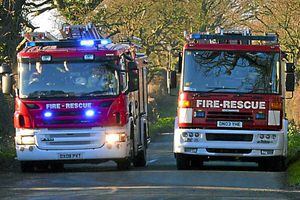Warning after 17 Shropshire chimney fire call-outs
Fire crews have been called out to 17 chimney fires since the start of November, prompting calls for people to take care during the coldest time of year.

Shropshire Fire & Rescue Service has warned people to be aware of the risks that open fires and log burners can pose.
Between November 1 and December 14 there were 17 chimney fires in Shropshire – five in the Oswestry area, two each in Bishop's Castle, Bridgnorth and Telford, and one each in Craven Arms, Minsterley, Whitchurch and Shrewsbury.
While most of the fires were dealt with by fire fighters quite quickly using chimney rods and stirrup pumps, others were more serious and involved more equipment and man power.
The worst was in Trefonen, near Oswestry, on November 14, and had spread from the chimney into the roof timbers.
In a call to Bayston Hill on December 5, firefighters had to use breathing apparatus to deal with a fire involving the chimney lining.
Sam Hamer, from the brigade's community fire safety department, said: "This is the time of the year when chimney fires increase simply because people have failed to have their chimneys swept. A chimney fire leaves a terrible mess in your home with the smell of smoke lingering for weeks. At worst they can lead to a serious house fire as flames spread through the roof space and if this happens at night when everyone is asleep the results could end in tragedy.
"People should not use unseasoned wood which leaves tar deposits inside chimneys and flues which can catch fire. There is also the danger of deadly carbon monoxide poisoning from unswept chimneys clogged by soot and smoke. Leaving a fire burning overnight is also dangerous.
"We just urge people to take precautions, call in a sweep, and ensure you have a working smoke alarm and carbon monoxide monitor installed. Call on any elderly people living nearby to ensure they too are protected."
Many home owners traditionally turn to open fires, Rayburns and wood burners to stay warm during winter's plunging temperatures, sparking a rise in the number of chimney fires the service is called out to.





